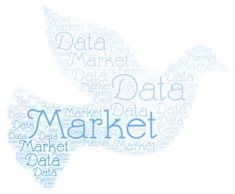
This article briefly looks at market data, that is, securities (tradeable and bankable financial assets) used by authorized data providers.
I write as someone with professional experience in the field, and as someone who closely follows industry developments, especially in the areas of management technologies and economic market data.
Market data represents a wide range of services primarily used by financial institutions and individual investors. These include quotes, ratings, news, and economic research. MD vendors such as Bloomberg and Refinitiv dominate the global market share, but there are a large number of localized or market-specific players.
Until the mid-19th century, news about what was happening in a business market was originally sent via horses and pigeons. The economic value of this information was limited because of the delay. With the invention of the telegraph in 1844 and the telephone in 1876, up to date data information was suddenly possible.
In the 1960s, computer programs for managing and disseminating 'real-time' data saw an explosion of information flows.
The internet and related technology further reshaped the market data industry in the early 21st century. What was once a highly consolidated industry was suddenly full of new players providing diverse or specialized services.
From a trader’s point of view, the economic value of market data corresponds to how well it measures market movement.
Traders want to sell at a higher price than they paid for an asset. Their challenge is determining the potential low and high prices to indicate when to buy or sell. There are many factors that can cause a market to move up or down. They include a country’s economic data, supply and demand changes, geopolitical events, or market sentiment, or speculation. Complicating it all is that one piece of data impacts a regional market differently depending on, for example, their dominant industry or company. What is economically profitable for one region can be negative for another.
With such complexity, traders need their market data to be reliable, fast, and useful both for technical and fundamental analysis. Whichever way you look at it, MD plays a central role in helping traders make good decisions.
Technical Analysis (TA) is often used to scrutinize previous trading activities or historical market data of a given security in order to yield valuable indicators like price trends and patterns.
Fundamental Analysis (FA), on the other hand, evaluates a security's value based on business results such as sales, earnings, and other financial factors in order to measure the intrinsic value of the security.
In general, TA is used for short to medium term trading while FA is more helpful for long-term value assessment. To complement these syntheses, data such as news, ratings, or research articles from trustworthy sources are key. In addition, other data not within traditional sources, such as alternative data sets can provide specific insights in an unconventional way to outsmart the market competition.
Value is a subjective concept. There are many institutional and individual investors whose primary investment strategy or principle is not only about the maximization of their private wealth value, but also values that are important to society and the environment. To address the win-win necessity of these clients, market data such as Environmental, Social and Corporate Governance (ESG) plays for some a critical role in investment strategies.
For market data vendors, data management is a vital part of the business model. Finding and highlighting insights from information changes data processing from an operational burden into a competitive advantage.
These services, however, are most vulnerable to disruption by software, because they provide information rather than concrete goods, making the price of entry low. Furthermore, in recent years, besides data volume surges and data technology advancements, the broad complexity of financial instruments and the globalization of market data have put a lot of business pressure on data management companies.
The questions and challenges these companies face include:
Data technology is extremely important for data companies. Historically, technical speed, or the ability to conduct high-frequency trading, was an advantage used only by large companies. Today, the democratization of financial technologies, commonly known as FinTech, has enabled all participants to access the same tools, thus leveling the playing field.
As a result, data intelligence and agility, rather than pure speed, now provides the competitive edge. Speed is about doing the same, iterative things quicker in order to generate an outcome. In agility, you engage with your business data in a way that is fast enough to drive a result.
From the get-go, the financial market has always been about information. Today, by leveraging new data technologies such as described below, financial market data has never been more valuable.
The potential applications of AI are endless. Machine learning, a subset of AI, deals with the algorithmic programs that can learn and adapt to new data by themselves, without the aid of a programmer.
The ability to just log in and run a program without any server infrastructure on-site is a cost-efficient way of delivering and receiving data services, applications and storage facilities, etc.
Unlike a data warehouse, where only formatted and structured data are stored, data lake’s architecture integrates all data regardless of source and type in their native format. Unprocessed data is ideal for any purpose usage such as machine learning.
Further reading:
The Future of Trading: Redefining Data
2. The Future of Trading: Technology in 2024
3. The Future of Trading: The People
Image: